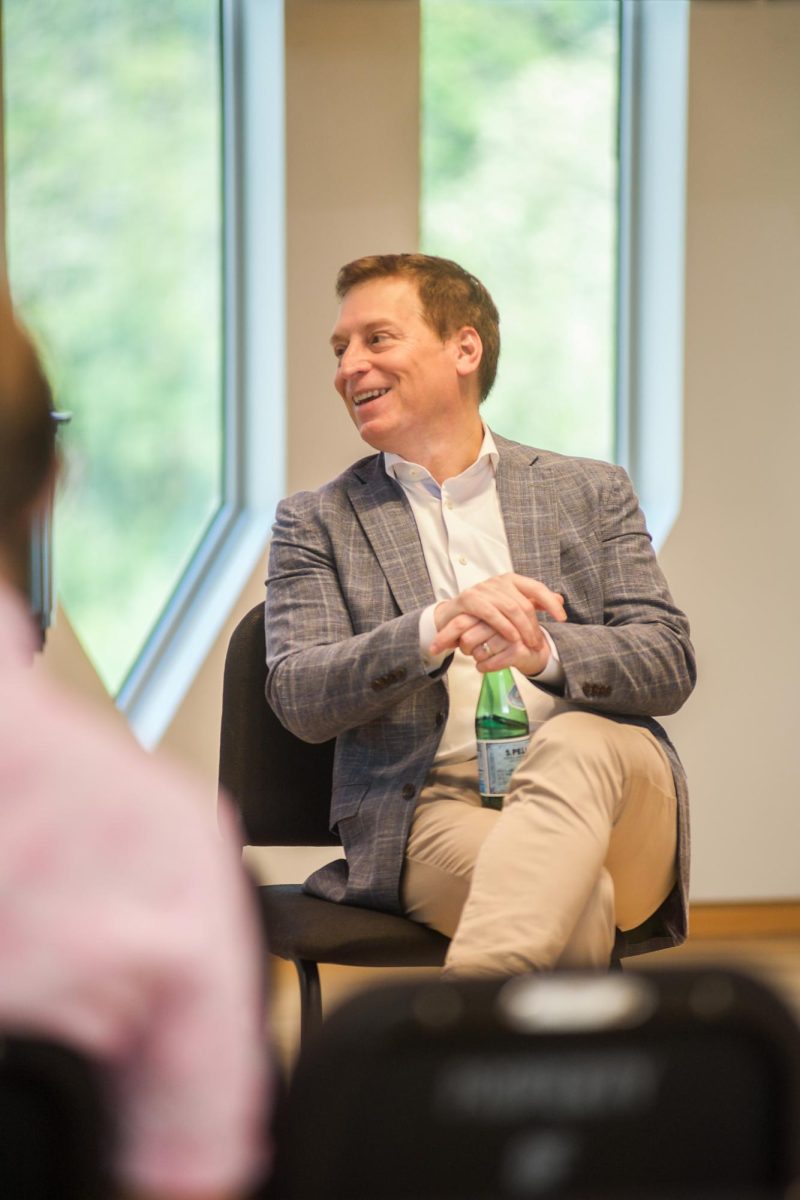This past weekend, President and CEO of the Cleveland Orchestra André Gremillet visited Oberlin to serve as a member of the 2024–25 Senior Concerto Competition jury and deliver a professional development talk about arts leadership. The talk, held in David H. Stull Recital Hall and titled “The Cleveland Orchestra Today… and Tomorrow,” was an opportunity for the Oberlin community to learn about the leadership and professional experience of one of the foremost figures in arts administration and music at the head of one of the world’s most renowned orchestras.
Before Gremillet began his time as the ninth CEO of the Cleveland Orchestra in 2016, he served as the managing director of the Melbourne Symphony Orchestra in Australia for three years, prior to which he was president and CEO of the New Jersey Symphony Orchestra for over five years. Gremillet holds an M.B.A. from McGill University.
Conservatory fourth-year Cendan Dillon and Conservatory third-year Matthew Brown found the talk especially valuable given their shared interest in arts administration careers.
“As an aspiring arts administrator, … a CEO is one of the best people to talk to,” Dillon said. “I found everything that he had to say very interesting, and I’m going to end up taking a lot from it in my future career.”
Brown shared similar sentiments.
“My favorite aspect about Oberlin has been the student body’s willingness to partake in large artistic projects,” Brown said. “It’s been a great joy for me to put together volunteer ensembles for unique concerts and experiences. Gremillet’s talk gave me better insight into how I can do this in my career outside Oberlin, when these projects will cost money and be expected to turn a profit.”
During his talk, Gremillet also discussed the Cleveland Orchestra’s 106-year history and rise to prestige, the leadership the orchestra has seen in that time, and the present-day status of the organization. The orchestra’s mission is to create extraordinary musical experiences that impact members of the Cleveland and Northeast Ohio community. Gremillet emphasized the importance of innovative programming and initiatives, and noted that the orchestra’s focus on serving the local community first distinguishes it from many similar major orchestras.
“I really enjoyed what [Gremillet] had to say about the Cleveland Orchestra’s duty to the Northeast Ohio region as well as its duty to the world,” Dillon said. “He talked a lot about digitizing the Cleveland Orchestra’s work as a way of serving the world so that more people had access to it. I also had never really understood the importance of orchestras going on tour until he broke it down.”
On the business side of operations, the Cleveland Orchestra is making waves in marketing and economic advancement in the classical music industry. It is the first of the world’s major orchestras to have a rewards program for attendees in response to the decline in annual subscriptions. The orchestra goes on seasonal tours around the world, and its online streaming platform Adella — launched in 2020 and named after Adella Prentiss Hughes, the founder and first general manager of the Cleveland Orchestra — has brought performances to an even wider audience. The orchestra’s recording label is also actively expanding, including an endeavor to record more Russian classical repertoire. Gremillet explained that the main motivation behind these innovations is not only preserving the tradition but also adapting to and fostering change in the world of orchestral music.
The second half of the talk was a facilitated question-and-answer session between Dean of the Conservatory William Quillen and Gremillet. Quillen asked about the logistical responsibilities of maintaining an orchestra, challenges facing the Cleveland Orchestra today, Gremillet’s own musical experience, and any advice he would have for students interested in arts administration as a career.
“I think Dean Quillen said something really powerful,” Dillon recalled. “He talked about how remarkable it was for the Cleveland Orchestra to be in our backyard. Literally a 40-minute drive right up the street is one of the best orchestras in the entire world — I would love to see Oberlin take more advantage of that, and to see more collaboration between them.”





